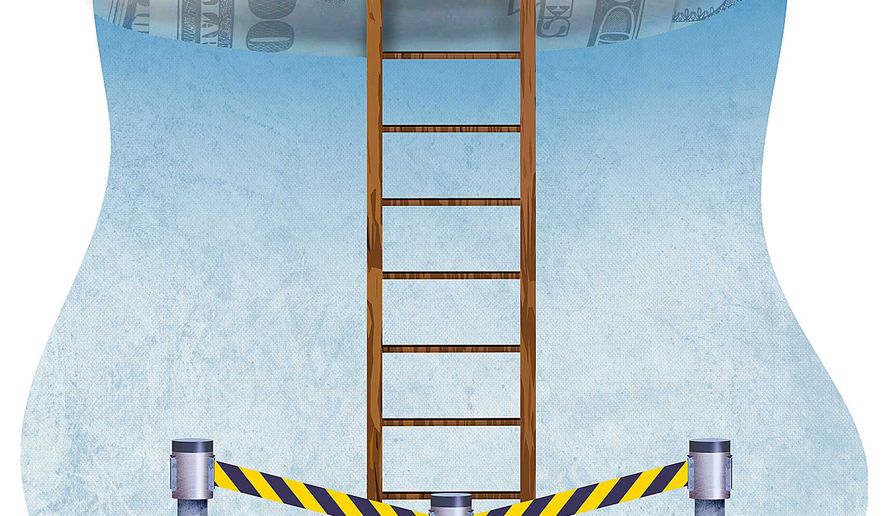OPINION:
What do auctioneers, butter tasters, florists, hair braiders, makeup artists and taxidermists all have in common? They need permission from the government, in the form of an occupational license, to do their jobs.
Of course, some occupational licenses are necessary to protect consumers from genuine health and safety risks. Too often, though, special-interest groups promote state licensing to benefit themselves at the expense of entrepreneurs, small-business owners and consumers. Unfortunately, this problem has exploded. The percentage of U.S. workers who need government permission to practice their occupation has grown from 5 percent in the 1950s to nearly 30 percent today. Studies suggest this has caused 2.8 million fewer jobs in our economy and more than $200 billion in additional annual costs for consumers.
In some instances, licensing requirements can be enforced in ways that are unjust, and in the case of a licensing board in Oregon, just downright bizarre. Recently, an Oregon resident spoke out publicly about the timing of the traffic lights in his city after his wife received a red light camera ticket. Based on calculations he had performed, he argued that the yellow light was too short. For this, he reportedly earned a $500 ticket from the state board of engineers for “the unlicensed practice of engineering.”
According to recent estimates, more than 1,100 occupations require a license in at least one state. That’s more than 1,100 occupations people cannot pursue without the government’s permission. And, in many cases, permission is irrationally difficult or expensive to get. For example, tree trimmers in Minneapolis must have a four-year forestry degree. Thirty-three states require auctioneers to have an average of 100 days of training while the average Emergency Medical Technician requires a mere 33 days of training. Trailing spouses in military families who must move from state to state, as well as veterans returning to the civilian workforce, are hit hard.
Regrettably, the explosive growth of occupational licensing is yet another example of how government regulation can benefit the few and the powerful. When government plays favorites, society as a whole suffers, with our most vulnerable citizens often bearing the burden. Freed of restraint that benefits the politically powerful, our markets best serve consumers by reducing prices, fostering innovation and creating new job opportunities. When President Trump named me (Maureen K. Ohlhausen) acting chairman of the Federal Trade Commission (FTC), my first policy initiative was to create the FTC’s Economic Liberty Task Force, which is working with state elected leaders and other officials who share our goal of occupational licensing reform. We encourage people to share their stories, ideas and report licensing abuses to EconLibertyTaskForce@ftc.gov. To learn more about states pursuing occupational licensing reform visit the Economic Liberty Task Force Website at Ftc.gov/econliberty.
When excessive, government-created regulation stands in the way of people realizing their potential in the work force, state leaders have a responsibility to take action. In Wisconsin, the issue is being met head-on. Over the past two decades, occupational licensing has ballooned in the Badger State: The number of regulated credential types overseen by Wisconsin’s Department of Safety and Professional Services has grown by more than 80 percent between 1996 and 2016.
Wisconsin’s budget proposal would subject efforts to create new licenses to stricter scrutiny, ensuring that state legislatures don’t lose sight of the barriers that licensure places in the path of aspiring workers. It would also establish an Occupational Licensing Review Council to recommend reforms to existing licenses, reducing needless regulations that prevent people from achieving gainful employment, while ensuring that public health and safety are protected. Wisconsin’s reform-minded lawmakers are developing similarly-motivated approaches. In Wisconsin, rewarding work and holding government accountable are top priorities.
Protecting our freedom to work, in a profession of our choosing, without unfair barriers to entry, is fundamental to our American way of life. Occupational licenses that unfairly protect entrenched special interests from new competition harm many low- and middle-income Americans. These citizens deserve better from our government.
We look forward to working together as partners and invite other states to join us and shed more light on licensing abuses and eliminate these unjust burdens on so many hardworking Americans.
• Maureen K. Ohlhausen is Federal Trade Commission acting chairman. Scott Walker is governor of Wisconsin.




Please read our comment policy before commenting.